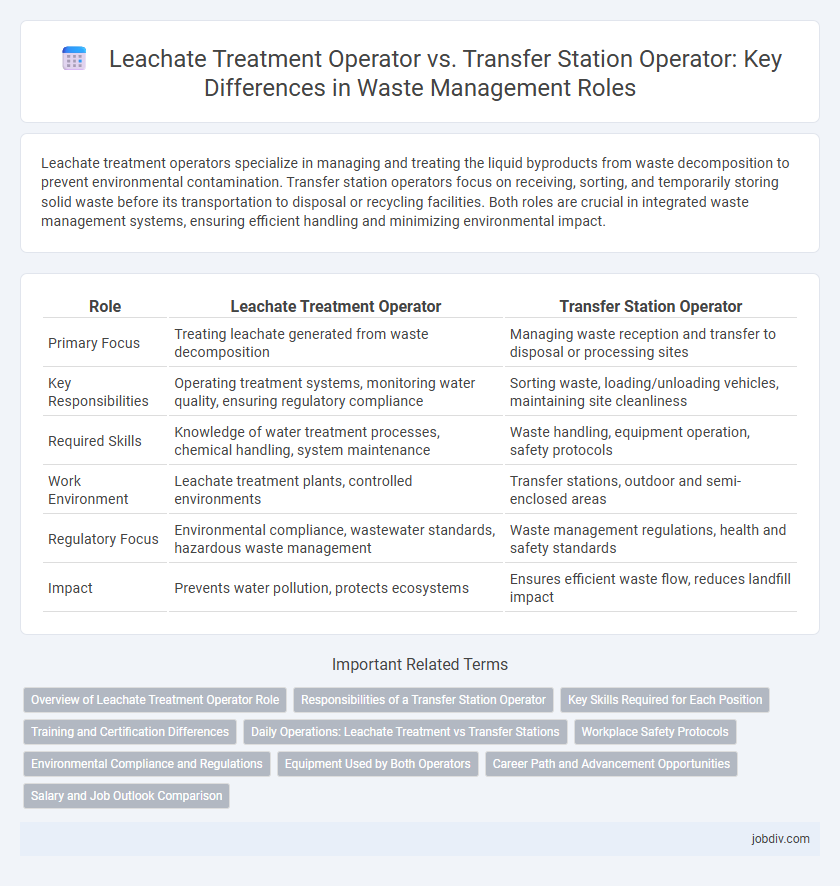Leachate treatment operators specialize in managing and treating the liquid byproducts from waste decomposition to prevent environmental contamination. Transfer station operators focus on receiving, sorting, and temporarily storing solid waste before its transportation to disposal or recycling facilities. Both roles are crucial in integrated waste management systems, ensuring efficient handling and minimizing environmental impact.
Table of Comparison
| Role | Leachate Treatment Operator | Transfer Station Operator |
|---|---|---|
| Primary Focus | Treating leachate generated from waste decomposition | Managing waste reception and transfer to disposal or processing sites |
| Key Responsibilities | Operating treatment systems, monitoring water quality, ensuring regulatory compliance | Sorting waste, loading/unloading vehicles, maintaining site cleanliness |
| Required Skills | Knowledge of water treatment processes, chemical handling, system maintenance | Waste handling, equipment operation, safety protocols |
| Work Environment | Leachate treatment plants, controlled environments | Transfer stations, outdoor and semi-enclosed areas |
| Regulatory Focus | Environmental compliance, wastewater standards, hazardous waste management | Waste management regulations, health and safety standards |
| Impact | Prevents water pollution, protects ecosystems | Ensures efficient waste flow, reduces landfill impact |
Overview of Leachate Treatment Operator Role
Leachate Treatment Operators specialize in managing and treating the liquid byproduct produced from waste decomposition in landfills, ensuring compliance with environmental regulations to prevent soil and water contamination. Their role involves operating advanced treatment systems such as aeration, filtration, and chemical dosing to remove hazardous substances from leachate before discharge or reuse. Proficiency in monitoring equipment performance, analyzing water quality data, and maintaining safety protocols distinguishes them from Transfer Station Operators, who primarily handle waste sorting and transfer logistics.
Responsibilities of a Transfer Station Operator
A Transfer Station Operator manages the intake, sorting, and temporary storage of waste materials before their transportation to disposal or recycling facilities. They ensure efficient waste flow, maintain equipment, and monitor safety protocols to prevent environmental contamination and operational hazards. Precise record-keeping and compliance with local waste regulations are essential to optimize transfer station operations and support sustainable waste management.
Key Skills Required for Each Position
Leachate Treatment Operators must possess strong knowledge of chemical processes, wastewater treatment systems, and environmental regulations to effectively manage hazardous liquid waste and prevent contamination. Transfer Station Operators require expertise in logistics management, heavy equipment operation, and safety protocols to efficiently handle solid waste sorting, compaction, and transfer. Both positions demand attention to detail, problem-solving abilities, and adherence to health and safety standards specific to waste management.
Training and Certification Differences
Leachate Treatment Operators require specialized training in chemical processes, environmental regulations, and hazardous waste management, often obtaining certifications such as the Wastewater Treatment Operator License or specific hazardous waste handling credentials. Transfer Station Operators focus on waste sorting, equipment operation, and safety protocols, typically needing certifications related to heavy machinery operation and Occupational Safety and Health Administration (OSHA) compliance. The certification requirements for Leachate Treatment Operators are more technical and environmentally focused, while Transfer Station Operators emphasize operational safety and machinery proficiency.
Daily Operations: Leachate Treatment vs Transfer Stations
Leachate Treatment Operators manage the daily monitoring and treatment of leachate to prevent environmental contamination, utilizing processes such as chemical dosing, filtration, and biological treatment to ensure regulatory compliance. Transfer Station Operators focus on the efficient sorting, compaction, and loading of waste materials for transport, maintaining equipment, and ensuring safety protocols to streamline waste transfer logistics. Both roles require diligent record-keeping and equipment maintenance, but Leachate Treatment emphasizes environmental engineering processes while Transfer Station centers on operational logistics and waste handling.
Workplace Safety Protocols
Leachate Treatment Operators strictly follow hazardous chemical handling protocols and personal protective equipment (PPE) requirements to mitigate exposure to toxic runoff during waste decomposition. Transfer Station Operators emphasize rigorous material segregation and heavy machinery operation safety to prevent injuries and contamination risks in the sorting and loading areas. Both roles prioritize emergency response training and adherence to environmental regulations to maintain secure and compliant waste management facilities.
Environmental Compliance and Regulations
Leachate Treatment Operators ensure environmental compliance by managing hazardous liquid waste through advanced filtration and chemical treatment processes that prevent soil and groundwater contamination. Transfer Station Operators focus on adhering to regulations by efficiently handling and sorting solid waste to minimize emissions and facilitate proper disposal or recycling. Both roles require strict knowledge of environmental laws such as the Resource Conservation and Recovery Act (RCRA) and the Clean Water Act (CWA) to maintain safe waste management practices.
Equipment Used by Both Operators
Leachate Treatment Operators primarily use specialized equipment such as aeration tanks, clarifiers, and chemical dosing systems to treat contaminated liquid from waste decomposition. Transfer Station Operators rely on heavy machinery including compactors, front loaders, conveyors, and balers to manage and process solid waste efficiently. Both roles require the operation and maintenance of equipment critical for handling waste streams but focus on distinctly different waste phases and treatment processes.
Career Path and Advancement Opportunities
Leachate Treatment Operators specialize in managing the processing of contaminated liquid generated by waste decomposition, advancing through technical certifications and roles in environmental compliance or plant supervision. Transfer Station Operators focus on the logistical coordination and sorting of solid waste, progressing toward management positions in waste facility operations or logistics. Career growth for both roles involves acquiring regulatory knowledge and operational expertise, with the opportunity to transition into higher-level environmental management or waste system planning roles.
Salary and Job Outlook Comparison
Leachate Treatment Operators earn an average salary of $52,000 annually, with a job outlook growth rate of 6% over the next decade, driven by increasing environmental regulations and waste management needs. Transfer Station Operators typically make around $45,000 per year, with a slightly lower projected growth rate of 4%, reflecting steady demand in waste sorting and transfer activities. Salary differences and job prospects largely hinge on specialized skills in wastewater treatment processes versus logistical operations at waste transfer facilities.
Leachate Treatment Operator vs Transfer Station Operator Infographic

 jobdiv.com
jobdiv.com